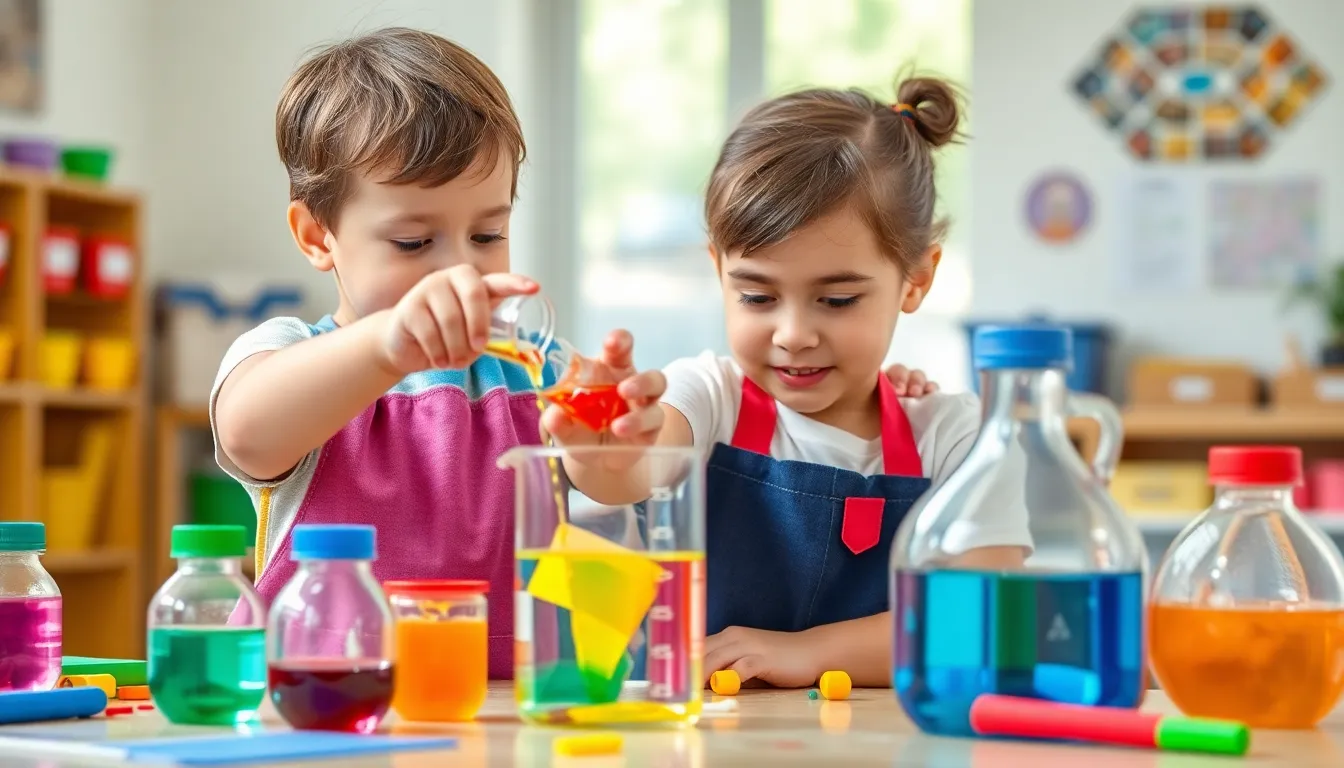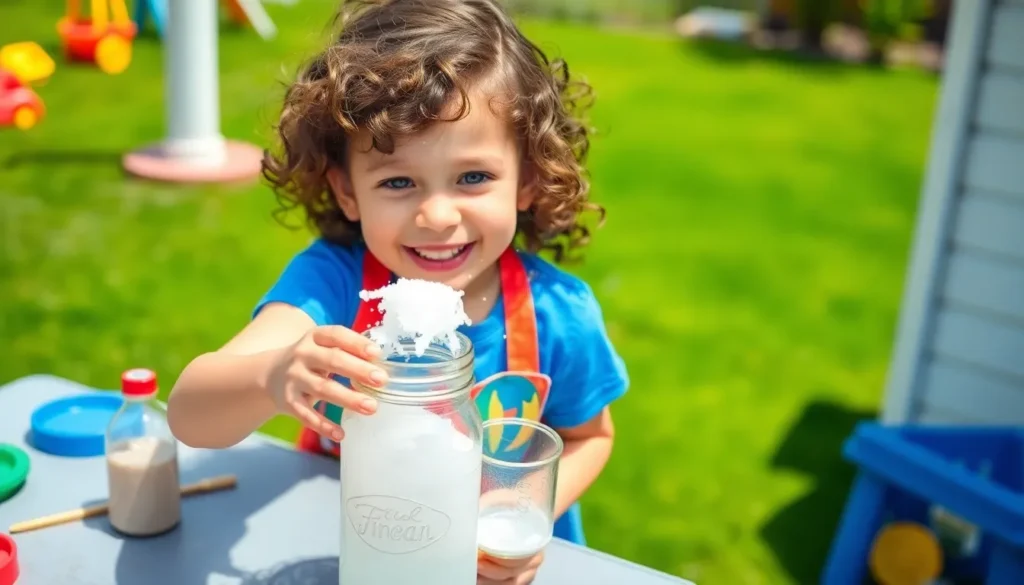Table of Contents
ToggleScience isn’t just for lab coats and goggles; it’s a world of wonder waiting to be explored, even by the tiniest hands. Preschoolers are naturally curious, and what better way to fuel that curiosity than with fun and engaging science projects? These little scientists are ready to mix, measure, and marvel at the magic of the world around them.
Engaging Science Projects for Preschoolers
Hands-on activities stimulate curiosity in preschoolers while introducing fundamental scientific concepts. Simple projects often create memorable experiences that foster a love for science.
- Volcano Eruption: Combine baking soda and vinegar in a bottle. Watching the chemical reaction resembles a volcanic eruption.
- Rainbow in a Jar: Layer sugar solutions of different densities in a jar. This colorful project demonstrates density while captivating children.
- Make a Tornado: Fill a clear jar partially with water. Swirling the water creates a mini tornado, illustrating vortex formation.
- Plant Growth: Plant seeds in clear containers. Observing root and shoot development teaches kids about plant biology.
- Magic Milk: Add food coloring to milk, then touch it with dish soap. The reaction creates beautiful patterns, revealing chemical interactions.
- Floating and Sinking: Gather various objects and explore buoyancy. This activity clarifies which items float and which sink in water.
- Weather Wheel: Create a simple weather wheel with different weather types. Children learn to identify and describe various weather conditions.
- Homemade Lava Lamp: Pour water and oil into a bottle, then add food coloring and an effervescent tablet. The resulting movement illustrates liquid density and reaction.
- Sound Exploration: Use different materials to make musical instruments. Children discover how sound varies with different surfaces and shapes.
- Ice Melting Race: Place ice cubes on different surfaces. Observing how quickly ice melts on various materials introduces concepts of insulation and temperature.
These engaging projects help children learn essential scientific principles while nurturing their innate curiosity. Each activity encourages exploration, making science both enjoyable and educational.
Benefits of Science Projects in Early Education

Science projects play a vital role in early education by captivating preschoolers’ natural curiosity. Engaging in hands-on activities nurtures children’s desire to explore and discover their surroundings.
Enhancing Curiosity and Exploration
Engagement in science projects ignites curiosity in preschoolers. Children encounter real-world phenomena, sparking questions about how things work. Exploration through activities like volcano eruptions and mini tornadoes encourages inquiry. Experimenting with plants and observing growth fosters connections to nature. Each project serves as a gateway to further questions, promoting a love for learning.
Developing Critical Thinking Skills
Critical thinking skills develop as preschoolers tackle science projects. Analyzing outcomes from experiments requires children to think logically. Understanding cause and effect emerges through activities like the ice melting race. Problem-solving skills flourish when faced with challenges, such as creating rainbows in jars. Encouraging them to predict, test, and reflect reinforces their ability to think independently. Each project offers an opportunity to practice these essential skills, laying the groundwork for future academic success.
Simple Science Projects for Preschoolers
Engaging preschoolers in science projects fosters curiosity and hands-on exploration. Here are some simple activities that are both educational and entertaining.
Easy and Fun Experiments
Preschoolers enjoy easy and fun experiments that introduce them to basic scientific concepts. A classic baking soda and vinegar volcano excites with its fizzing eruption. Mixing food coloring with milk and dish soap creates swirling patterns that delight. Discussing floating and sinking objects enhances understanding of buoyancy. An ice melting race on various surfaces teaches about temperature effects. Each experiment captivates young minds and encourages further questioning.
Materials You Can Find at Home
Common household items make excellent materials for science projects. Baking soda and vinegar, often found in kitchens, work well for chemical reactions. Milk, food coloring, and dish soap create vibrant visual experiments. Everyday items like cups, bowls, and spoons serve as tools for conducting activities. Paper towels and plastic containers also help with cleanup and experimentation. Using familiar materials enriches the learning experience, making science accessible and enjoyable for preschoolers.
The Role of Play in Learning Science
Play serves as an essential avenue for preschoolers to engage with science concepts. Such activities encourage exploration and curiosity while allowing children to interact with their environment. Hands-on experiences facilitate learning, making complex ideas more tangible.
Experimentation through play allows children to ask questions and seek answers. As they mix materials like baking soda and vinegar, preschoolers witness chemical reactions firsthand. This type of engagement fosters critical thinking and problem-solving skills.
Moreover, projects like creating rainbows with layered sugar solutions illustrate concepts of density and light. Children’s active participation enhances understanding, transforming abstract ideas into concrete experiences. Through these experiments, they not only learn scientific principles but also develop patience and persistence.
Social interaction during play further enriches the learning process. Working in groups fosters communication skills as children share observations and findings. This collaborative spirit reinforces the value of teamwork in scientific inquiry.
By encouraging exploration, play ignites a passion for science in young learners. The excitement of creating a mini tornado or exploring buoyancy inspires a lifelong love for discovery. Each project serves as a building block, supporting future academic pursuits while making science enjoyable.
Scientific understanding grows when preschoolers engage in these playful activities. Each experience contributes to a holistic learning environment, nurturing their natural curiosity and fostering independent thinking. These foundational experiences lay the groundwork for future scientific exploration and inquiry.
Tips for Conducting Successful Science Projects
Selecting appropriate projects is essential for preschoolers. Focus on age-appropriate activities that spark curiosity and enthusiasm. Use common household items to ensure accessibility and minimize costs. Materials like baking soda, vinegar, food coloring, and milk can create engaging experiences.
Creating a safe environment is crucial. Supervise children during experiments and clarify safety measures, such as avoiding ingestion of non-food substances. Encourage exploration but set clear boundaries that ensure safety.
Planning step-by-step instructions enhances understanding. Break down each project into manageable steps, making it easier for preschoolers to follow along. Use simple language to explain processes, ensuring comprehension.
Encouraging questions fosters critical thinking. Ask open-ended questions throughout the experiment to stimulate inquiry and discussion. Prompts like “What do you think will happen?” keep kids engaged while guiding them toward deeper understanding.
Providing opportunities for collaboration encourages social interaction. Pair preschoolers for teamwork, allowing them to share observations and ideas. This interaction supports communication skills while reinforcing the learning experience.
Documenting results can enhance the learning process. Use drawings, photos, or simple charts to help children visualize outcomes. Recording data makes the experience memorable and reinforces concepts learned during the project.
Promoting reflection after the project extends the learning experience. Discuss outcomes and what was learned together. Engage kids in conversation about their favorite parts of the activity, helping solidify their understanding and enthusiasm for science.
Engaging preschoolers in science projects not only nurtures their curiosity but also lays the foundation for critical thinking and problem-solving skills. These hands-on activities transform learning into an exciting adventure where young minds can explore and discover. By using simple materials found at home, parents and educators can create memorable experiences that spark a lifelong love for science.
The joy of experimentation encourages children to ask questions and collaborate with peers, enhancing their social skills in the process. As preschoolers dive into these projects, they gain valuable insights into the world around them. Ultimately, fostering a playful exploration of science today sets the stage for future academic success and inquiry.







